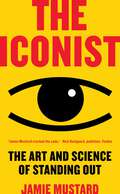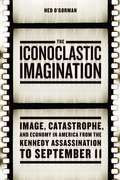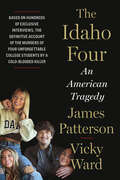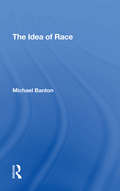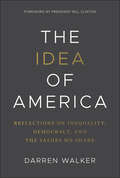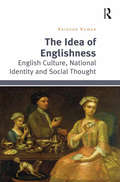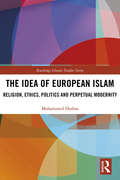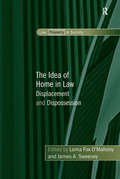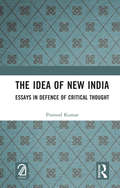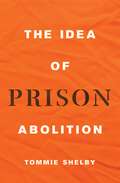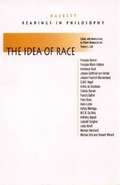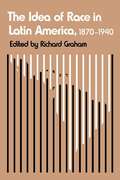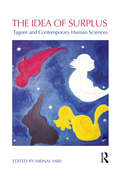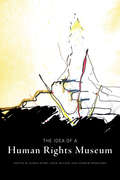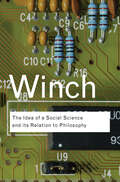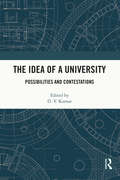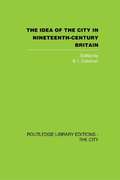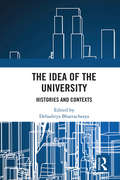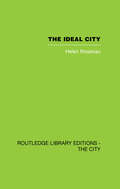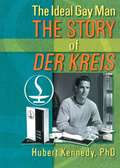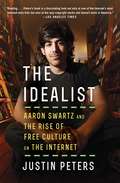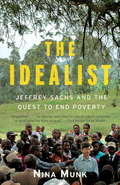- Table View
- List View
The Iconist: The Art and Science of Standing Out
by Jamie MustardWinner of the 2019 O.W.L. Outstanding Works of Literature Award Why do we immediately recognize art by Van Gogh and Warhol? What does Beethoven share with Rage Against the Machine and Madonna? What makes us remember the words of Churchill and King (and Domino's Pizza, for that matter)? With the rise of digital media and advertising, a constant barrage of information makes it nearly impossible to be seen and heard. In The Iconist, branding and design strategist Jamie Mustard shows you how individuals, organizations, and brands can break through the noise. The secret to standing out lies in creating content that the desired audience will "lock" onto and remember with little effort—simple, bold ideas that can be immediately understood. The Iconist reveals a set of primal laws in human society that explain why some things stand out and endure in the mind, while others are rejected. Blending relevant examples from history and pop culture with cutting-edge psychology, Mustard explores why certain things stick and others fade from memory—and gives you an owner's manual to make any idea, product, or service stand out and be remembered. Forget relying on luck or trial-and-error: Mastering this process will enable you, no matter your field or endeavor, to confidently craft messages that resonate with your target audience through simple, fool-proof methods. For businesses, marketers, teachers, advertisers, artists—from thought leaders to anyone trying to write a resume—The Iconist shows how to grab and hold attention. Fair warning, though: This book will change the way you view your audience . . . and the entire world around you.
The Iconoclastic Imagination: Image, Catastrophe, and Economy in America from the Kennedy Assassination to September 11
by Ned O'GormanBloody, fiery spectacles--the Challenger disaster, 9/11, JFK's assassination--have given us moments of catastrophe that make it easy to answer the "where were you when" question and shape our ways of seeing what came before and after. Why are these spectacles so packed with meaning? In The Iconoclastic Imagination, Ned O'Gorman approaches each of these moments as an image of icon-destruction that give us distinct ways to imagine social existence in American life. He argues that the Cold War gave rise to crises in political, aesthetic, and political-aesthetic representations. Locating all of these crises within a "neoliberal imaginary," O'Gorman explains that since the Kennedy assassination, the most powerful way to see "America" has been in the destruction of representative American symbols or icons. This, in turn, has profound implications for a neoliberal economy, social philosophy, and public policy. Richly interwoven with philosophical, theological, and rhetorical traditions, the book offers a new foundation for a complex and innovative approach to studying Cold War America, political theory, and visual culture.
The Iconoclastic Imagination: Image, Catastrophe, and Economy in America from the Kennedy Assassination to September 11
by Ned O'GormanBloody, fiery spectacles—the Challenger disaster, 9/11, JFK’s assassination—have given us moments of catastrophe that make it easy to answer the “where were you when” question and shape our ways of seeing what came before and after. Why are these spectacles so packed with meaning? In The Iconoclastic Imagination, Ned O’Gorman approaches each of these moments as an image of icon-destruction that give us distinct ways to imagine social existence in American life. He argues that the Cold War gave rise to crises in political, aesthetic, and political-aesthetic representations. Locating all of these crises within a “neoliberal imaginary,” O’Gorman explains that since the Kennedy assassination, the most powerful way to see “America” has been in the destruction of representative American symbols or icons. This, in turn, has profound implications for a neoliberal economy, social philosophy, and public policy. Richly interwoven with philosophical, theological, and rhetorical traditions, the book offers a new foundation for a complex and innovative approach to studying Cold War America, political theory, and visual culture.
The Idaho Four: An American Tragedy
by James Patterson Vicky WardInstant #1 New York Times bestseller! &“A vivid portrait...a sensitive tribute…a paean to youth, community, and the tenacity of local law enforcement.&” —New York Times &“A mesmerizing read and a great detective story, yet sadly all true…With their book The Idaho Four, James Patterson and Vicky Ward have written perhaps the definitive account of the murders—a disturbing, necessary portrait of a killer and his victims.&” —Guardian&“New revelations…James Patterson and Vicky Ward reveal new details and attempt to lift the veil of secrecy that has shrouded the Idaho college murders case for more than two years.&” —Good Morning America&“This is much more than a true crime book. It&’s a vivid exploration of the range of human response when faceless terror strikes. It&’s a portrait of America in this polarized moment.&” —Town & Country&“A lot of brand-new reporting. Clears up a number of mysteries.&” —Morning Joe The murders of four innocent college students attending the University of Idaho left us all with so many questions. Now, after more than 300 interviews, James Patterson and prize-winning journalist Vicky Ward finally have the answers. We know what it was like to live in Moscow, Idaho, on November 13, 2022, the day of the cold-blooded killings. We know what the local police and FBI did right. And what they did wrong. We&’ve learned so much about the four heartbroken families—the Mogens, Goncalveses, Kernodles, and Chapins. And we have the backstory for Bryan Kohberger, brilliant grad student, loner, apparent incel. Now you are the jury. The evidence is in.You&’ve watched the Prime documentary, One Night in Idaho, now read the &“clearest profile yet of the twisted quadruple killer and his motives&” (New York Post).
The Idea Of Race
by Michael BantonThis book deals with the study of race relations as a general body of knowledge which tries to bring together in a common framework studies of group relations in different countries. It explores the intellectual context within which the old conception of race relations arose.
The Idea of America: Reflections on Inequality, Democracy, and the Values We Share
by Darren WalkerDarren Walker has lived the promise of America. Born to a single mother in a Louisiana charity hospital, the pride of Head Start and public schools in rural East Texas, Walker serves today as the tenth President of the Ford Foundation, among the largest private foundations in the United States. Since 2013, he has overseen more than $7 billion in grantmaking, while transforming philanthropy and inspiring conversations about and commitments to democratic values and institutions around the world. As Walker writes, “I have lived on both sides of American inequality. And I know, all too personally, that the distance between the two has never been greater.” In The Idea of America: Reflections on Inequality, Democracy, and the Values We Share, Walker argues that we can narrow our widening divides by rediscovering our common aspirations and common good. With an original foreword by President William Jefferson Clinton, this prescient, timely compendium introduces us to an essential leader of and for our moment—in his own words—through his most essential reflections, essays, and speeches. Across 97 selected pieces, many published here for the first time, Walker shares from his: Uniquely American story and extraordinary life's journey Bold leadership of the Ford Foundation, whose efforts and assets he marshaled to uproot inequalities of all kinds Audacious vision for a philanthropy that prioritizes justice beyond generosity—and that practices a new Gospel of Wealth for our new gilded age Lifelong passion for arts and culture, wellsprings of empathy and of social change Trailblazing advocacy for a more democratic capitalism, which ensures that where markets lead, justice follows Urgent reaffirmation of America's enduring promise—that from many, we are one, and that all deserve dignity, fairness, and opportunity Ultimately, Walker calls for courageous, moral leadership from us all—challenging us to step back from the extremes, to lean into nuance and complexity, and to build longer bridges. “Hope,” Walker affirms, “is the oxygen of democracy.” The Idea of America gives powerful testimony to all that is possible “if we renew our fidelity to the values that bind us, both despite and because of our differences.”
The Idea of Englishness: English Culture, National Identity and Social Thought
by Krishan KumarIdeas of Englishness, and of the English nation, have become a matter of renewed interest in recent years as a result of threats to the integrity of the United Kingdom and the perceived rise of that unusual thing, English nationalism. Interrogating the idea of an English nation, and of how that might compare with other concepts of nationhood, this book enquires into the origins of English national identity, partly by questioning the assumption of its long-standing existence. It investigates the role of the British empire - the largest empire in world history - in the creation of English and British identities, and the results of its disappearance. Considering the ’myths of the English’ - the ideas and images that the English and others have constructed about their history and their sense of themselves as a people - the distinctiveness of English social thought (in comparison with that of other nations), the relationship between English and British identity and the relationship of Englishness to Europe, this wide-ranging, comparative and historical approach to understanding the particular nature of Englishness and English national identity, will appeal to scholars of sociology, cultural studies and history with interests in English and British national identity and debates about England’s future place in the United Kingdom.
The Idea of European Islam: Religion, Ethics, Politics and Perpetual Modernity (Routledge Islamic Studies Series)
by Mohammed HashasSuspicions about the integration of Islam into European cultures have been steadily on the rise, and dramatically so since 9/11. One reason lies in the visibility of anti-Western Islamic discourses of salafi origin, which have monopolized the debate on the "true" Islam, not only among Muslims but also in the eyes of the general population across Europe; these discourses combined with Islamophobic discourses reinforce the so-called incompatibility between the West and Islam. This book breaks away from this clash between Islam and the West, by arguing that European Islam is possible. It analyzes the contribution that European Islam has made to the formation of an innovative Islamic theology that is deeply ethicist and modern, and it clarifies how this constructed European Islamic theology is able to contribute to the various debates that are related to secular-liberal democracies of Western Europe. Part I introduces four major projects that defend the idea of European Islam from different disciplines and perspectives: politics, political theology, jurisprudence and philosophy. Part II uses the frameworks from three major philosophers and scholars to approach the idea of European Islam in the context of secular-liberal societies: British scholar George Hourani, Moroccan philosopher Taha Abderrahmane and the American philosopher John Rawls. The book shows that the ongoing efforts of European Muslim thinkers to revisit the concept of citizenship and political community can be seen as a new kind of political theology, in opposition to radical forms of Islamic thinking in some Muslim-majority countries. Opening a new path for examining Islamic thought "in and of" Europe, this book will appeal to students and scholars of Islamic Studies, Islam in the West and Political Theology.
The Idea of Home in Law: Displacement and Dispossession (Law, Property and Society)
by Lorna Fox O'Mahony James A. SweeneyThe Idea of Home in Law: Displacement and Dispossession explores an important set of legal and policy issues surrounding the concepts of home and homelessness, taking a growing area of legal scholarship into the new arena of human rights and international law. The collection considers the ideas concerning home - both in the sense of the dwelling place as a special type of property, and territorial claims to homeland - which underpin many contemporary legal problems, by examining a range of contexts where people are displaced or dispossessed from their homes. The essays focusing on dispossession consider themes ranging from mortgage and rent arrears in the UK to responses to the foreclosure crisis in the USA, and from eviction for the purposes of economic development in South Africa to the exclusion of asylum seekers from the UK's social housing and welfare provision, and within the framework of the European Convention on Human Rights. The displacement theme, meanwhile, examines transnational 'home' issues from the experiences of exiles and refugees in areas of conflict to the impact of the broader context of economic, social and cultural rights on attempts to protect housing and home through international law. At the heart of each essay the contributors, experts from across the fields of law, policy, and housing rights, examine the circumstances in which displacement and dispossession take place, and reconsider how law and policy respond to such circumstances with a particular focus on the impact of loss of home for the human person. At a time of particular and increasing concern about security of tenure and the role of law and policy in protecting people who are vulnerable to forced eviction, The Idea of Home in Law presents a bold opportunity to raise questions about the 'rights' and norms associated with housing and home, and to generate new insights for scholarship and for national and international policy debates concerning displacement and dispossession.
The Idea of New India: Essays in Defence of Critical Thought
by Pramod KumarThe idea of ‘New India’ has acquired a new currency. The dominant grammar of politics dilutes the critical impulse and deters the expression of alternate politics. The interpretive possibilities have been replaced by a reactive exchange. Technology is presented as a panacea, rather than just a facilitator. Legitimacy and normative dignity for these ideas is acquired by redefining the role of the institutions and also through constitutional amendments. A major intellectual effort is required to reformulate public policy, governance systems and social relations to balance the opposite claims of market efficiency and economic growth with social equity and justice.Please note: Taylor & Francis does not sell or distribute the Hardback in India, Pakistan, Nepal, Bhutan, Bangladesh and Sri Lanka.
The Idea of Prison Abolition (Carl G. Hempel Lecture Series #13)
by Tommie ShelbyAn incisive and sympathetic examination of the case for ending the practice of imprisonmentDespite its omnipresence and long history, imprisonment is a deeply troubling practice. In the United States and elsewhere, prison conditions are inhumane, prisoners are treated without dignity, and sentences are extremely harsh. Mass incarceration and its devastating impact on black communities have been widely condemned as neoslavery or &“the new Jim Crow.&” Can the practice of imprisonment be reformed, or does justice require it to be ended altogether? In The Idea of Prison Abolition, Tommie Shelby examines the abolitionist case against prisons and its formidable challenge to would-be prison reformers.Philosophers have long theorized punishment and its justifications, but they haven&’t paid enough attention to incarceration or its related problems in societies structured by racial and economic injustice. Taking up this urgent topic, Shelby argues that prisons, once reformed and under the right circumstances, can be legitimate and effective tools of crime control. Yet he draws on insights from black radicals and leading prison abolitionists, especially Angela Davis, to argue that we should dramatically decrease imprisonment and think beyond bars when responding to the problem of crime.While a world without prisons might be utopian, The Idea of Prison Abolition makes the case that we can make meaningful progress toward this ideal by abolishing the structural injustices that too often lead to crime and its harmful consequences.
The Idea of Race
by Tommy L. Lott Robert BernasconiA survey of the historical development of the idea of race, this anthology offers pre-twentieth century theories about the concept of race, classic twentieth century sources reiterating and contesting ideas of race as scientific, and several philosophically relevant essays that discuss the issues presented. A general Introduction gives an overview of the readings. Headnotes introduce each selection. Includes suggested further readings.
The Idea of Race in Latin America, 1870-1940
by Richard GrahamFrom the mid-nineteenth century until the 1930s, many Latin American leaders faced a difficult dilemma regarding the idea of race. On the one hand, they aspired to an ever-closer connection to Europe and North America, where, during much of this period, "scientific" thought condemned nonwhite races to an inferior category. Yet, with the heterogeneous racial makeup of their societies clearly before them and a growing sense of national identity impelling consideration of national futures, Latin American leaders hesitated. What to do? Whom to believe?Latin American political and intellectual leaders' sometimes anguished responses to these dilemmas form the subject of The Idea of Race in Latin America. Thomas Skidmore, Aline Helg, and Alan Knight have each contributed chapters that succinctly explore various aspects of the story in Brazil, Argentina, Cuba, and Mexico. While keenly alert to the social and economic differences that distinguish one Latin American society from another, each author has also addressed common issues that Richard Graham ably draws together in a brief introduction. Written in a style that will make it accessible to the undergraduate, this book will appeal as well to the sophisticated scholar.
The Idea of Surplus: Tagore and Contemporary Human Sciences
by Mrinal MiriThis book provides an analytical understanding of some of Tagore’s most contested and celebrated works and ideas. It reflects on his critique of nationalism, aesthetic worldview, and the idea of ‘surplus in man’ underlying his life and works. It discusses the creative notion of surplus that stands not for ‘profit’ or ‘value’, but for celebrating human beings’ continuous quest for reaching out beyond one’s limits. It highlights, among other themes, how the idea of being ‘Indian’ involves stages of evolution through a complex matrix of ideals, values and actions—cultural, historical, literary and ideological. Examining the notion of the ‘universal’, contemporary scholars come together in this volume to show how ‘surplus in man’ is generated over the life of concrete particulars through creativity. The work brings forth a social scientific account of Tagore’s thoughts and critically reconstructs many of his epochal ideas. Lucid in analysis and bolstered with historical reflection, this book will be a major intervention in understanding Tagore’s works and its relevance for the contemporary human and social sciences. It will interest scholars and researchers of philosophy, literature and cultural studies.
The Idea of a Human Rights Museum
by Ruth B. Phillips Mary Reid A. Dirk Moses Adam Muller Andrew Woolford Angela Failler Christopher Powell Karen Busby Jennifer Carter Clint Curle Helen Fallding Jodi Giesbrecht Amanda Grzyb George Jacob Stephen Jaeger Jorge A. Nállim Ken Norman Armando Perla David Petrasek Roger I. Simon Struan Sinclair"The Idea of a Human Rights Museum" is the first book to examine the formation of the Canadian Museum for Human Rights and to situate the museum within the context of the international proliferation of such institutions. Sixteen essays consider the wider political, cultural and architectural contexts within which the museum physically and conceptually evolved drawing comparisons between the CMHR and institutions elsewhere in the world that emphasize human rights and social justice. This collection brings together authors from diverse fields—law, cultural studies, museum studies, sociology, history, political science, and literature—to critically assess the potentials and pitfalls of human rights education through “ideas” museums. Accessible, engaging, and informative, the collection’s essays will encourage museum-goers to think more deeply about the content of human rights exhibits. The Idea of a Human Rights Museum is the first title in the University of Manitoba Press’s Human Rights and Social Justice Series. This series publishes work that explores the quest for social justice and the basic rights and freedoms to which all human beings are entitled, including civil, political, economic, social, collective, and cultural rights.
The Idea of a Social Science and its Relation to Philosophy
by Peter WinchIn the fiftieth anniversary of this book's first release, Winch's argument remains as crucial as ever. Originally published in 1958, The Idea of a Social Science and Its Relation to Philosophy was a landmark exploration of the social sciences, written at a time when that field was still young and had not yet joined the Humanities and the Natural Sciences as the third great domain of the Academy. A passionate defender of the importance of philosophy to a full understanding of 'society' against those who would deem it an irrelevant 'ivory towers' pursuit, Winch draws from the works of such thinkers as Ludwig Wittgenstein, J. S. Mill and Max Weber to make his case. In so doing he addresses the possibility and practice of a comprehensive 'science of society'.
The Idea of a University: Possibilities and Contestations
by D. V. KumarThis volume engages with the idea of a university, the importance of intellectual inquiry and research, and the articulation of diverse political views and dissent. It discusses the prominent ideas and debates around universities and their nature and contributions, within the historical and social context of India. The chapters reflect on the importance of critical thinking and the rigorous research process, the engagement of students with socio-political discourse, and academic freedom. They also examine issues around the instrumentalisation of knowledge production, commodification of education, the clash between political forces and universities, intellectual freedom in research and teaching, inclusivity and accessibility of higher education, as well as the autonomy and identity of universities. With insightful contributions from prominent scholars and thinkers in India, this volume will be of interest to academics and students of sociology, political science, education, public policy and governance, philosophy of education and South Asian studies. It will also be useful for readers interested in the debates on universities and their relationship with politics and society.
The Idea of the City in Nineteenth-Century Britain
by B. I. ColemanIn nineteenth-century Britain, ahead of the rest of the world in economic development, many towns and cities grew to a size that only London had attained before. This volume focuses on the intellectual and controversial response of the period's leading men and women to the key issues of urbanization and its surrounding social problems. The extracts selected date from 1785 to 1909, and are drawn from the writings, reports and speeches of admirers of city life and its most passionate critics, optimists and alarmists, advocates of back-to-the-land panaceas, and reformers who aspired to control and reform cities. Contemporaries quoted include Dickens, Cobbett, Carlyle, Disraeli, Engels, Mrs Gaskell, Ruskin, Joseph Chamberlain, William Morris, Charles Booth, H.G. Wells and Seebohm Rowntree. In a valuable introduction the editor indicates the main preoccupations of the debate abotu the city, proposes a periodization for it, adn shows its connections with other controversies and issues, as Victorian Britain found itself entering an 'age of great cities'. This book was first published in 1973.
The Idea of the Muslim World: A Global Intellectual History
by Cemil AydinAs Cemil Aydin explains in this provocative history, it is a misconception to think that the world’s 1.5 billion Muslims constitute a single religio-political entity. How did this mistaken belief arise, why is it so widespread, and how can its grip be loosened so that a more fruitful discussion about politics in Muslim societies can begin?
The Idea of the University: Histories and Contexts
by Debaditya BhattacharyaWhat is this ‘idea’ of the university? Why does it need to be defended? Does the work of defense preclude the task of rearranging the idea itself? Drawing on these essential questions, this volume traces the historical transformations of the university in medieval Europe and explores current debates on its existence and sustenance in a neoliberal India. It challenges the liberal-humanist ‘ideal’ of academic exchange to inquire into long befuddled debates on the true nature of the modern university. Along with its companion The University Unthought: Notes for a Future, this brave new intervention makes a compelling foray into the political future(s) of the university. It will be of interest to academics, educators and students of the social sciences and humanities, especially education. It will also be of use to policy-makers and education analysts, and central to the concerns of any citizen.
The Ideal City: Its Architectural Evolution in Europe
by Helen RosenauThe concept of the 'ideal city' is, perhaps, more important today - when planners and architects are so firmly confined by considerations of our immediate environment - than ever before. Yet it is a concept which has profoundly influenced the western world throughout history, both as a regulative model and as an inspiration. Rosenau traces the progress of the concept from biblical sources through the hellenistic and Roman empires to the Renaissance and the later Age of Enlightenment, when the emphasis shifted from religious to social considerations. She goes on to discuss the resultant nineteenth-century ideal planning, when the idea of social betterment was approached with a specific and conscious effort. This book was first published in 1983.
The Ideal Gay Man: The Story of Der Kreis
by Hubert KennedyDiscover the deliciously succulent homosexual world of the early 1900s!The Ideal Gay Man: The Story of Der Kreis gives you the history of the influential international gay journal Der Kreis, published in Switzerland from 1932--1967. You’ll gain fascinating insight into the journal’s origins, its development, and the reasons for its demise. Entertaining and informative, this book points out how the events of the day relating to the gay movement were reflected in and influenced by Der Kreis.Der Kreis was the world’s most important journal promoting the legal and social rights of gay men. Literary historians, gay theory scholars, and general readers will be intrigued by the generous selection of articles from the English section of the journal, as well as the English translations from the French and German sections. The Ideal Gay Man is a fascinating collection of history and entertainment. Some topics you’ll explore are: the beginning of the publication Der Kreis why Der Kreis stopped publication sections on the English writers, French writers, and German writers of Der Kreis articles on morality and the public’s changing perceptions of homosexuality man and boy love and the differences between leading and seductionThe Ideal Gay Man studies this amazingly influential gentlemen’s journal and provides you with a flattering and long overdue inclusion into gay studies material. You will explore the homosexual world during a turbulent time of intolerance and discover how the events relating to the gay movement were reflected in and influenced by Der Kreis.
The Idealist
by Justin PetersA smart, lively history of the Internet free culture movement and its larger effects on society--and the life and shocking suicide of Aaron Swartz, a founding developer of Reddit and Creative Commons--from Slate correspondent Justin Peters.Aaron Swartz was a zealous young advocate for the free exchange of information and creative content online. He committed suicide in 2013 after being indicted by the government for illegally downloading millions of academic articles from a nonprofit online database. From the age of fifteen, when Swartz, a computer prodigy, worked with Lawrence Lessig to launch Creative Commons, to his years as a fighter for copyright reform and open information, to his work leading the protests against the Stop Online Piracy Act (SOPA), to his posthumous status as a cultural icon, Swartz's life was inextricably connected to the free culture movement. Now Justin Peters examines Swartz's life in the context of 200 years of struggle over the control of information. In vivid, accessible prose, The Idealist situates Swartz in the context of other "data moralists" past and present, from lexicographer Noah Webster to ebook pioneer Michael Hart to NSA whistleblower Edward Snowden. In the process, the book explores the history of copyright statutes and the public domain; examines archivists' ongoing quest to build the "library of the future"; and charts the rise of open access, copyleft, and other ideologies that have come to challenge protectionist IP policies. Peters also breaks down the government's case against Swartz and explains how we reached the point where federally funded academic research came to be considered private property, and downloading that material in bulk came to be considered a federal crime. The Idealist is an important investigation of the fate of the digital commons in an increasingly corporatized Internet, and an essential look at the impact of the free culture movement on our daily lives and on generations to come.
The Idealist
by Nina MunkNAMED ONE OF THE BEST BOOKS OF THE YEAR BY Bloomberg * Forbes * The SpectatorRecipient of Foreign Policy's 2013 Albie AwardA powerful portrayal of Jeffrey Sachs's ambitious quest to end global poverty "The poor you will always have with you," to cite the Gospel of Matthew 26:11. Jeffrey Sachs--celebrated economist, special advisor to the Secretary General of the United Nations, and author of the influential bestseller The End of Poverty--disagrees. In his view, poverty is a problem that can be solved. With single-minded determination he has attempted to put into practice his theories about ending extreme poverty, to prove that the world's most destitute people can be lifted onto "the ladder of development." In 2006, Sachs launched the Millennium Villages Project, a daring five-year experiment designed to test his theories in Africa. The first Millennium village was in Sauri, a remote cluster of farming communities in western Kenya. The initial results were encouraging. With his first taste of success, and backed by one hundred twenty million dollars from George Soros and other likeminded donors, Sachs rolled out a dozen model villages in ten sub-Saharan countries. Once his approach was validated it would be scaled up across the entire continent. At least that was the idea. For the past six years, Nina Munk has reported deeply on the Millennium Villages Project, accompanying Sachs on his official trips to Africa and listening in on conversations with heads-of-state, humanitarian organizations, rival economists, and development experts. She has immersed herself in the lives of people in two Millennium villages: Ruhiira, in southwest Uganda, and Dertu, in the arid borderland between Kenya and Somalia. Accepting the hospitality of camel herders and small-hold farmers, and witnessing their struggle to survive, Munk came to understand the real-life issues that challenge Sachs's formula for ending global poverty. THE IDEALIST is the profound and moving story of what happens when the abstract theories of a brilliant, driven man meet the reality of human life.
The Idealist: Aaron Swartz and the Rise of Free Culture on the Internet
by Justin PetersThis smart, “riveting” (Los Angeles Times) history of the Internet free culture movement and its larger effects on society—and the life and shocking suicide of Aaron Swartz, a founding developer of Reddit and Creative Commons—written by Slate correspondent Justin Peters “captures Swartz flawlessly” (The New York Times Book Review).Aaron Swartz was a zealous young advocate for the free exchange of information and creative content online. He committed suicide in 2013 after being indicted by the government for illegally downloading millions of academic articles from a nonprofit online database. From the age of fifteen, when Swartz, a computer prodigy, worked with Lawrence Lessig to launch Creative Commons, to his years as a fighter for copyright reform and open information, to his work leading the protests against the Stop Online Piracy Act (SOPA), to his posthumous status as a cultural icon, Swartz’s life was inextricably connected to the free culture movement. Now Justin Peters examines Swartz’s life in the context of 200 years of struggle over the control of information. In vivid, accessible prose, The Idealist situates Swartz in the context of other “data moralists” past and present, from lexicographer Noah Webster to ebook pioneer Michael Hart to NSA whistleblower Edward Snowden. In the process, the book explores the history of copyright statutes and the public domain; examines archivists’ ongoing quest to build the “library of the future”; and charts the rise of open access, the copyleft movement, and other ideologies that have come to challenge protectionist intellectual property policies. Peters also breaks down the government’s case against Swartz and explains how we reached the point where federally funded academic research came to be considered private property, and downloading that material in bulk came to be considered a federal crime. The Idealist is “an excellent survey of the intellectual property battlefield, and a sobering memorial to its most tragic victim” (The Boston Globe) and an essential look at the impact of the free culture movement on our daily lives and on generations to come.
